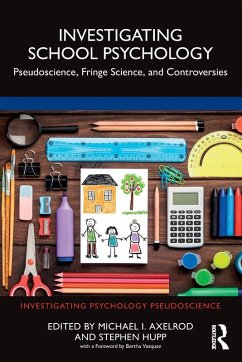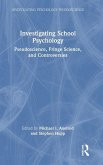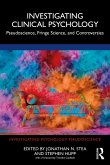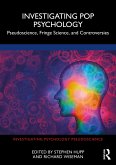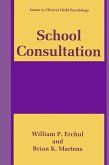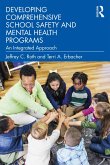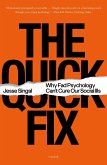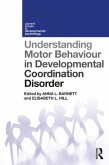Investigating School Psychology provides a fascinating exploration of the field of school psychology through the lens of pseudoscience and fringe science. Contributions from leaders in the fields of school psychology, clinical psychology, and education honor the role of science in the field while also exploring and guarding against the harms that pseudoscience can cause.
School psychology and, more broadly, the field of education are particularly susceptible to pseudoscience, fads, and maintaining the status quo by resisting the adoption of new ideas. Using an exhaustive review of the current literature, this book discusses various concepts in school psychology that have been largely discredited and many practices that continue to exist with little to no scientific support. Each chapter helps differentiate between dubious and evidence-based approaches while providing a useful resource for practicing school psychologists and educators to distinguish between science and pseudoscience in their everyday work with children. The book's discussion of the harmful nature of pseudoscience in school psychology is inclusive of all students, such as students with disabilities, those diagnosed with neurodevelopmental disorders, those with academic problems, and all other children in schools.
Investigating School Psychology is valuable supplemental reading in undergraduate and graduate courses in education and school psychology and is also a beneficial reference for practicing school psychologists to distinguish between science and pseudoscience in their practice.
School psychology and, more broadly, the field of education are particularly susceptible to pseudoscience, fads, and maintaining the status quo by resisting the adoption of new ideas. Using an exhaustive review of the current literature, this book discusses various concepts in school psychology that have been largely discredited and many practices that continue to exist with little to no scientific support. Each chapter helps differentiate between dubious and evidence-based approaches while providing a useful resource for practicing school psychologists and educators to distinguish between science and pseudoscience in their everyday work with children. The book's discussion of the harmful nature of pseudoscience in school psychology is inclusive of all students, such as students with disabilities, those diagnosed with neurodevelopmental disorders, those with academic problems, and all other children in schools.
Investigating School Psychology is valuable supplemental reading in undergraduate and graduate courses in education and school psychology and is also a beneficial reference for practicing school psychologists to distinguish between science and pseudoscience in their practice.
"Most people make up their minds based on very limited information. Support for this assertion can be found in myriad surveys, polls, and descriptions of public opinion. School psychology is a domain where strongly held yet non scientifically supported opinions are rampant. The unfortunate result is the risk of harmful child practices. This book identifies several examples of practices and/or perspectives that masquerade as factual and sets the record straight with relevant scientific findings. Thus it is an ideal companion for texts used by professors teaching classes to students majoring in child psychology in general and school psychology in particular."
Patrick Friman, PhD, ABPP Vice President of Behavioral Health, Boys Town; Professor of Pediatrics, University of Nebraska Medical Center, USA.
"Investigating School Psychology: Pseudoscience, Fringe Science, and Controversies offers a comprehensive yet easily digestible summary of the research refuting the most common and harmful myths in school psychology and education. Axelrod and Hupp have brought together leading scholars in the field to create an informative resource for anyone invested in our schools and the well-being of children. The book should be required reading for all policy makers in education."
Renee O. Hawkins, PhD, Director of the School of Human Services and Professor in the Ed.S. and Ph.D. School Psychology Programs at the University of Cincinnati, USA.
Patrick Friman, PhD, ABPP Vice President of Behavioral Health, Boys Town; Professor of Pediatrics, University of Nebraska Medical Center, USA.
"Investigating School Psychology: Pseudoscience, Fringe Science, and Controversies offers a comprehensive yet easily digestible summary of the research refuting the most common and harmful myths in school psychology and education. Axelrod and Hupp have brought together leading scholars in the field to create an informative resource for anyone invested in our schools and the well-being of children. The book should be required reading for all policy makers in education."
Renee O. Hawkins, PhD, Director of the School of Human Services and Professor in the Ed.S. and Ph.D. School Psychology Programs at the University of Cincinnati, USA.

